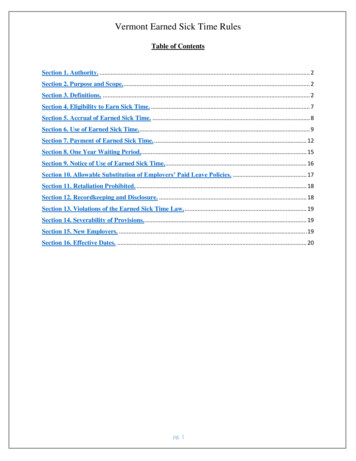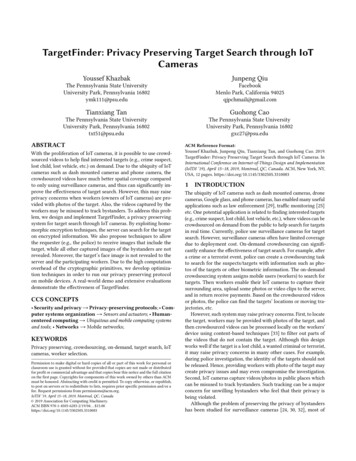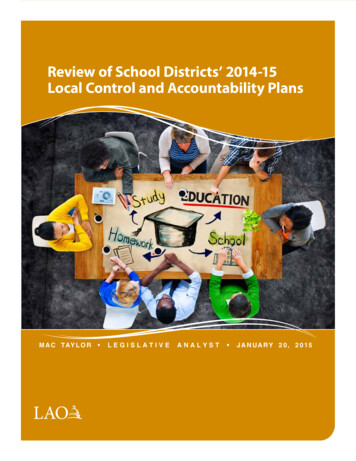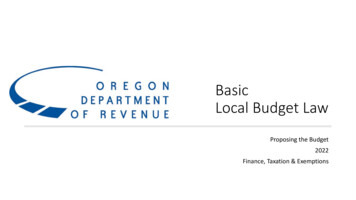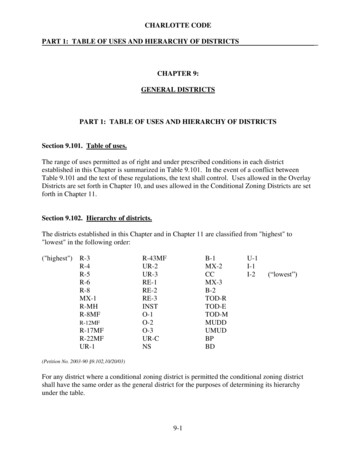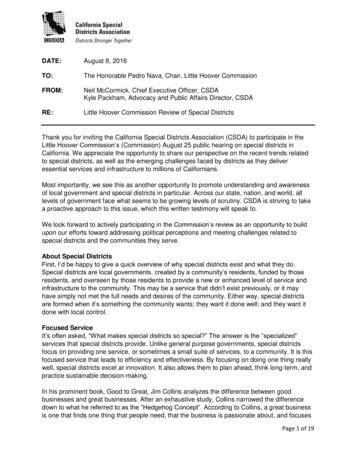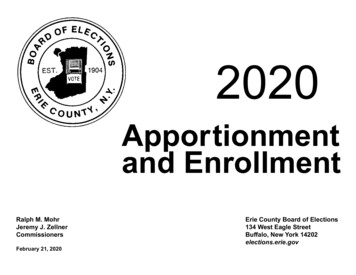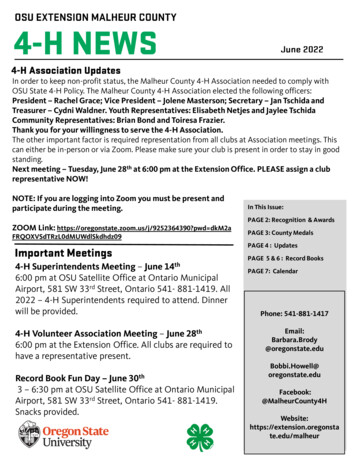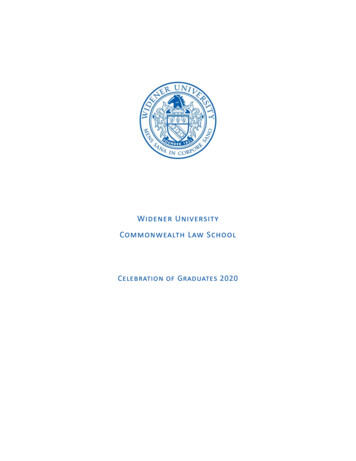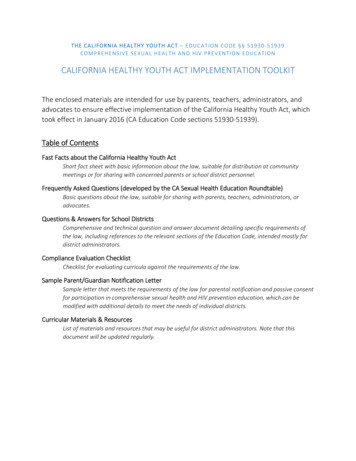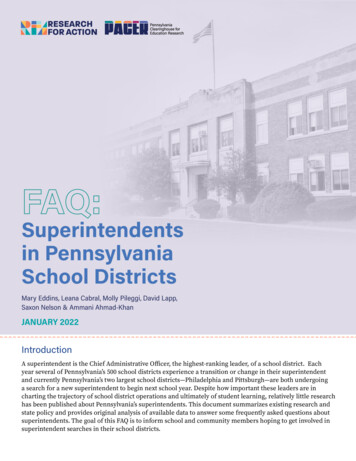
Transcription
FAQ:Superintendentsin PennsylvaniaSchool DistrictsMary Eddins, Leana Cabral, Molly Pileggi, David Lapp,Saxon Nelson & Ammani Ahmad-KhanJANUARY 2022IntroductionA superintendent is the Chief Administrative Officer, the highest-ranking leader, of a school district. Eachyear several of Pennsylvania’s 500 school districts experience a transition or change in their superintendentand currently Pennsylvania’s two largest school districts—Philadelphia and Pittsburgh—are both undergoinga search for a new superintendent to begin next school year. Despite how important these leaders are incharting the trajectory of school district operations and ultimately of student learning, relatively little researchhas been published about Pennsylvania’s superintendents. This document summarizes existing research andstate policy and provides original analysis of available data to answer some frequently asked questions aboutsuperintendents. The goal of this FAQ is to inform school and community members hoping to get involved insuperintendent searches in their school districts.
What are the roles and responsibilities of superintendents?A superintendent operates the local public school system as directed by the school district’s boardof directors. Like the chief executive of any organization, the specific roles and responsibilities of asuperintendent vary based on the characteristics of the organization, or in this case the school districtlocal education agency (LEA). The leadership style of an individual superintendent can also impact howresponsibilities are handled. Geographic and demographic contexts also influence the role. For example,superintendents in large urban districts with high poverty rates may face higher pressure to improve studenttest scores or overcome more severe budget deficits. They also may operate in a political space that differssignificantly from superintendents in suburban or rural districts, which are often smaller but spread out overa larger geography.Despite these varied contextual factors, Section 1081 of the PA School Code outlines a uniform set ofexpectations for all superintendents. For example, the law grants all superintendents the right to attend andspeak at board meetings, but not the right to vote. Regulations from the State Board of Education providefurther detail. Together Pennsylvania’s expectations for superintendents generally align with nationalresearch. Below in Table 1, we categorize four critical components of the superintendent role (districtmanagement, finance, decision-making, and community engagement) and summarize key responsibilitiesassociated with each.Table 1: Summary of Research on the Roles and Responsibilities of SuperintendentsCategoryExample responsibilities and tasksDistrictManagement Reports to the board of school directors about status of schools. Hires, supervises, and manages district-level senior staff and school leaders. Ensures compliance with state and federal policies and benchmarks. Conducts classroom observations and site visits. Sets professional development expectations. Prepares the annual budget. Analyzes spending data to determine costs and benefits of district spending. Outlines a vision or strategic plan for the district to improve or overcome specific challenges.(For example, a strategic plan may target closing the opportunity gap or improving disciplinepolicies. Here is a strategic plan from Pittsburgh Public Schools.) Determines educational programming. (For example, the superintendent may lead efforts toprovide students 1:1 electronic devices or invest in a new reading program.) Provides policy recommendations to the school board and other officials in local and stategovernment and supports policy implementation. Communicates district progress and challenges to the broader community. Collaborates with board and other interested parties, including teacher or other labor Q: Superintendents in Pennsylvania School Districts2
Do charter schools have superintendents?No. Charter school LEAs are led by a chief executive officer (CEO), which can be any “individual appointed bythe board of trustees to oversee and manage the operation of the charter school.” 24 Pa. Stat. § 17-1703-A.The charter school law requires no credentialing, experience, or training for a charter school CEO. However,guidance from the Pennsylvania Department of Education clarifies that, “If a CEO actually performs the dutiesof a principal, that individual must hold appropriate state certification as a principal,” which involves holdingan Administrative Certificate.Who is eligible to serve as a superintendent?Superintendent candidates do not necessarily need experience in teaching or as a school-based leader.A background in finance or business can be sufficient with some additional steps. The Pennsylvania schoolcode outlines the necessary credentials for individuals seeking to become a superintendent. The PennsylvaniaDepartment of Education (PDE) is authorized to administer those requirements and to issue candidates aLetter of Eligibility or a Commission Qualification Letter, either of which provides eligibility to be hired as asuperintendent. The potential routes to becoming a superintendent in Pennsylvania are detailed in Figure 1:Figure 1. Routes to Becoming a Superintendent in PennsylvaniaRouteDegree RequirementsBachelor’sdegreeor higherTraditionalRouteGraduate degreeAlternateRoutesOIOPTOPTION1N2Experience Requirements Completion of PA-approved,graduate-level superintendent6 years satisfactory schoolcertification program with aexperience with at least 3 yearsminimum 3.0 GPA.in administrative orsupervisory capacity. Satisfactory achievement onthe PA-required test.4 years of relevant experiencein the fields of business,industry, or education Bachelor’s degreeor higherAdditional RequirementsWithin initial contract term,completion of a leadershipdevelopment program thatmeets PA School LeadershipStandards under 24 P.S. 12-1217.1CredentialLetter ce as a chiefrecovery officer orfinancial administratorNote: The PA school code also requires superintendent candidates, and all professional employees, to be of “good moral character.”While many superintendents such as Dr. William Hite (Philadelphia SD 2012-2022) and Dr. Anthony Hamlet(Pittsburgh Public SD 2016-21) have taken a traditional route to become superintendent by serving asclassroom educators and school administrators, others such as Mark Roosevelt (Pittsburgh Public 2005-10)and Paul Vallas (Philadelphia SD 2002-2007) had backgrounds in business or finance. In contrast, the currentinterim receiver of Chester Upland School District, Nafis Nichols, would likely be eligible to become asuperintendent in the future through the Option 2 alternate route.1 There are currently three options to meet the Pennsylvania School Leadership Standards requirement:1. A state-approved, graduate-level superintendent certification program2. The PIL/NISL Executive Development Program3. The PASA New Superintendents’ AcademyFAQ: Superintendents in Pennsylvania School Districts3
What are the experience levels and academic credentials of PA superintendents?Pennsylvania’s publicly available data do not identify superintendents’ years of experience specific to thesuperintendent role but do provide total years of experience in PA public education as a whole. RFA calculatedthat in 2020-21, superintendents in Pennsylvania had an average of 24 years of total experience working inPA public education in at least some capacity, 11 years of which were spent working in their current schooldistrict (Figure 2).Figure 2. Average years of experience for PA Superintendents in 2020-21 Note: This experience includes previous years serving as a superintendent,principal, other school leader, educator, or other school-basedprofessional. Years of experience in private schools or in schools outside of PA are not included in this calculation. The average years of experienceserving as a superintendent was not able to be calculated using available data.Data Source: PDE’s professional staffing data.2In 2020-21, almost all PA superintendents had a graduate degree, with 55.1% having completed a doctorateand 43.7% with a master’s or specialist degree (Figure 3). These findings are similar to the SchoolSuperintendents Association (AASA) 2021 national study showing 52.4% of superintendents have a doctorateand 43.5% have a master’s or specialist degree.Figure 3. PA Superintendent Degree Attainment 2020-21 2 Most of the characteristics RFA analyzed (gender, years of experience, and degree level) can be found through the datapublished on PDE’s website. Staff race or ethnicity is not publicly available and was secured by RFA through a formal records request.FAQ: Superintendents in Pennsylvania School Districts4
What are the gender3 and racial demographics of PA’s superintendents?As shown in Figures 4 and 5, superintendents in the state of PA are mostly men (75%) and predominantlyWhite (95%).Figure 4. Pennsylvania Superintendents by Gender, 2020-21 Figure 5: Pennsylvania Superintendents by Race or Ethnicity, 2020-21 Note: Race or ethnicity is labeled above as recorded by Pennsylvania Department of Education.These Pennsylvania superintendent demographics are slightly more disparate than national rates. In a 2021national study, surveying 1,509 superintendents across 48 states, the AASA found 73.8% of superintendentswho responded identified as male and 89.3% identified as White.Moreover, Pennsylvania’s share of female superintendents has decreased over the past eight years, from 28.3%in 2013-14 (not shown) to only 24.6% in 2020-21. Over the same time, the total share of superintendents ofcolor increased slightly, from 2.4% in 2013-14 (not shown) to 4.6% in 2020-21, with the largest change amongsuperintendents who identify as Black, whose share increased from 2.2% to 3.8%.Meanwhile, the characteristics of PA superintendents represent stark racial and gender disparities whencompared to teacher and student demographics. For example, women made up 74% of PA teachers, but only25% of superintendents. Additionally, 36% of Pennsylvania’s public school students are persons of color,compared to only 4.6% of Pennsylvania’s superintendents.43 PDE data on gender is limited to male/female and does not reflect other gender identities, such as non-binary.4 This disparity is even larger than race/ethnicity disparity between the share of students of color (36%) and teachers of color (6%), which isamong the most disparate in the country as RFA documented in Teacher Diversity in Pennsylvania from 2013-14 to 2019-20.FAQ: Superintendents in Pennsylvania School Districts5
How much do superintendents get paid?In the 2020-21 school year, the average annual salary for a superintendent at a PA public school district,as reported in the PDE Individual Staffing Data, was 153,812. This average includes wide variation insuperintendent salaries across PA districts even among the highest paying districts as shown in Table 2.Table 2. The 10 highest superintendent salaries in Pennsylvania in 2020-21:DistrictSuperintendent SalaryPhiladelphia City SD (Philadelphia, PA) 325,245Unionville-Chadds Ford SD (Kennett Square, PA) 286,840North Penn SD (Lansdale, PA) 286,536Downingtown Area SD (Downingtown, PA) 282,568West Chester Area SD (West Chester, PA) 282,220Lower Merion SD (Ardmore, PA) 270,000Colonial SD (Plymouth Meeting, PA) 254,262Tredyffrin/Easttown SD (Wayne, PA) 252,150Springfield Township SD (Oreland, PA) 251,464Great Valley SD (Malvern, PA) 250,376The School District of Philadelphia (SDP) had the highest superintendent salary in 2020-21. SDP has a highstudent poverty rate and a history of underfunding, but the district is also many times larger than anyother school system in the state. Meanwhile, the other districts in the top 10 include many of the wealthiestcommunities in the Commonwealth. Pittsburgh School District, the second largest district in the state, ranked#23 with a superintendent salary of 229,473 in 2020-21.How long do superintendents typically serve in their role?Superintendent time in role varies widely. There have been district, state, and national reports abouthigh superintendent turnover rates and a common narrative frames short superintendent tenure as aharmful trend for urban districts that, as previously noted, may face heighten pressures or challenges. Ifsuperintendents only stay in a position for a few years, districts are unlikely to see the effects of a strategicplan or policy reforms really take effect.Nationally, estimates of the average tenure of superintendents range from 3-6 years, depending on how tenureor turnover is defined or which districts are included in the sample. For example, a 2018 Broad Center Reportfound large-district superintendents had an average completed tenure of 6.16 years, a national study in 2000found average tenure ranged between 5-6 years, and a study in 2014 from the Council of the Great City Schoolsfound average tenure for superintendents was 3.18 years.FAQ: Superintendents in Pennsylvania School Districts6
To examine superintendent turnover, RFA calculated the number of superintendents5 employed by eachPennsylvania district during an eight-year span from 2013-14 and 2020-21 using PDE Professional Staffing Data.As shown in Table 3 most districts were led by only one or two superintendents during these eight years (0-1transitions), while 7 districts had 4 or 5 transitions during the same period.Table 3. Pennsylvania School Districts by Number of Superintendent Transitions, 2013-14 to 2020-21Number of Superintendent TransitionsNo transitionNumber of Districts147 One transition Two transitions23091 Three transitions25 6 Four transitionsFive transitions1Notably, Superintendent William Hite recently announced his upcoming resignation after a tenure of nearly10 years at the School District of Philadelphia and Superintendent Anthony Hamlet resigned from PittsburghPublic Schools after five years.Very little research examines why superintendents leave their positions, but a 2012 study of Californiasuperintendents found age to be the primary predictor of retirement. Other factors like relationships withthe school board or leaving a position for a larger district offering a higher salary have also been identified asreasons for leaving. Recent reporting has also named the heightened stress of the pandemic due to strugglesreopening school and navigating remote learning as a contributing factor superintendent resignations acrossthe United States.Are superintendents ever evaluated for their performance?Yes. In fact, school boards in Pennsylvania are now required by law to conduct formal superintendentevaluations. Table 4 answers key questions about the main components of superintendent evaluation for PAdistricts:Table 4. Components of Superintendent Evaluation for Pennsylvania School DistrictsWho?The school board should evaluate the district superintendent.What?Evaluations are directly related to a superintendent contract as contracts must include dutiesand performance expectations (including assessment tools and timelines). Evaluation criteriacan include:- District-established annual measurable objectives- Student achievement on the state assessments like the PSSA or student growth as measured by thePennsylvania Value-Added Assessment System (PVAAS)- Student attrition and graduation rates- Financial management standards and standards of operational excellenceWhen?According to Section 1073.1 of the School Code, superintendents must be assessed annually under objectivecriteria. PASA notes that many districts tie evaluation to the school calendar and fiscal year planning, althoughit is ultimately up to districts to outline the timeline for evaluation in the superintendent’s contract.Where?Both the criteria and the completed evaluations must be publicly posted on the district’s website.Why?Apart from the requirement by law, PASA cites that superintendent evaluations are essential fordistrict alignment, communication, and accountability5 This analysis includes both superintendents and/or acting superintendents as categorized in the data set.FAQ: Superintendents in Pennsylvania School Districts7
The Pennsylvania Department of Education does not designate a specific evaluation tool that districts mustutilize. However, the Pennsylvania Association of School Administrators (PASA) provides a sample evaluationtool, sample objective performance standards, and a framework for developing performance standards/evaluation tools.Click here to review an example of a completed evaluation, the 2018-19 evaluation of Superintendent Hitefrom the School District of Philadelphia.RFA also identified several resources that provide best practices to help school boards avoid commonchallenges with superintendent evaluation.6Is there evidence of superintendents impacting student learning?There is very little evidence of superintendents impacting student learning. For example, a 2016 study foundthat superintendents account for a very small amount (0.3%) of differences in student achievement and thathiring a new superintendent is not associated with improved student achievement. As the highest rankingofficial in a school district, superintendents tend to receive credit when things go well and blame when theydo not, however inspirational leaders that make drastic and enduring improvements are incredibly rare.In the book Spinning Wheels, Frederick M. Hess argued that education reform efforts often do not setsuperintendents up for success. As administrators who are often seen as political appointees, superintendentcandidates are typically hired if they promise innovation and change rather than steady implementationand improvement of predecessor’s initiatives. According to Hess, such innovation should not be preferredover the persistence and commitment that leads to proper implementation and planning.7Who hires or terminates a superintendent?Pennsylvania law grants the authority to hire a superintendent to the board of school directors for eachschool district. Decisions must be approved by majority vote at a public meeting held under the PennsylvaniaSunshine Act. The board must enter a contract with the superintendent between 3-5 years, which containsthe full terms and conditions of employment, including the duties, responsibilities, job description andperformance expectations. The contract should be available to the public through the PA Right-to-KnowLaw. The local school board is also the body that can terminate the superintendent for “neglect of duty,incompetency, intemperance, or immorality.”If a school district is governed by an entity other than a school board, the process may be different. Forexample, in Philadelphia Superintendent Hite was hired in 2010, by the state- and city-appointed SchoolReform Commission.6 Hanover Research’s Best Practices in Superintendent Evaluation (2015); American Association of School Administrators’ (AASA) Evaluating aSuperintendent White Paper (2010); AASA’s journal article Superintendent Evaluation Frameworks for Continuous Improvement: UsingEvidence-based Processes to Promote the Stance of Improvement (2018); AASA’s Revisiting Superintendent Evaluation (2007); WashingtonStandards-Based Superintendent Evaluation (2013)7 Evaluating a Superintendent White Paper (2010); AASA’s journal article Superintendent Evaluation Frameworks for Continuous Improvement:Using Evidence-based Processes to Promote the Stance of Improvement (2018); AASA’s Revisiting Superintendent Evaluation (2007); WashingtonStandards-Based Superintendent Evaluation (2013)FAQ: Superintendents in Pennsylvania School Districts8
How can school and community members get involved in the hiring process for anew superintendent?As mentioned, the Pennsylvania Sunshine Act and Right-to-Know Law grant community members the rightto attend and sign up to speak at public meetings of a school board and to request public records related toa superintendent’s contract and performance. There are many other ways community members can seekto have their voice heard in school board decisions, such as writing a letter or email to board members,submitting a Letter to the Editor or Op-Ed to a local paper, or hosting and inviting board members to alistening session to hear ideas and gather input from members of your community about what matters tothem in the superintendent search.Many district school boards create additional opportunities for community involvement when selecting a newsuperintendent. As of publication, Pittsburgh Public Schools has not yet announced any public process, butthe School District of Philadelphia’s Board of Education has designed several opportunities for communityengagement in their search for the next superintendent. These opportunities include:1. Listening sessions. These virtual and in-person sessions began in October 2021 as a strategy tohear from a wide range of stakeholders such as parents, students, teachers, district employees, andadvocates. Attendees provided input on the skills required for the next leader.2. Online survey. The board distributed the #PHLSuperSearch online survey and compiled feedback intoan engagement report. Like the listening sessions, survey feedback provided insight into the requiredskills and talents of the next superintendent.3. Superintendent Search Advisory Committee (SSAC). The Board recently established a 13-membercommittee to include diverse perspectives in the review of final candidates. Committee membersinclude an SDP teacher and principal, two students, parents/guardians of students, and othercommunity members. The SSAC will conduct confidential interviews with five finalists and theseinterviews will help inform the Board’s selection of two final candidates.4. Public meet and greet. There will be a public meet and greet to hear from the final two candidatesbefore a final selection is made by the Board.You can learn more here about the School District of Philadelphia’s community engagement process, includingthe expected timeline of the superintendent search.About PACER and Research for ActionThe Pennsylvania Clearinghouse for Education Research (PACER) is a project of Research for Action (RFA), aPennsylvania-based nonprofit education research organization. RFA seeks to use research as the basis for theimprovement of educational opportunities and outcomes for historically underserved children and students.The PACER project is designed to inform state education policy discussions through rigorous, objectiveresearch; regular policy briefs; and research-based commentaries. For more information, please visit ourwebsite at CER is funded with generous support from The Heinz Endowments and the William Penn Foundation.The opinions expressed in this report are those of the authors and do not necessarily reflect the views of thefunders. Thank you to the many members of the RFA team who contributed to this report, including AnnaShaw-Amoah, Dae Kim, Samantha Slade, and Kate Callahan.FAQ: Superintendents in Pennsylvania School Districts9
In the 2020-21 school year, the average annual salary for a superintendent at a PA public school district, as reported in the PDE Individual Staffing Data, was 153,812. This average includes wide variation in superintendent salaries across PA districts even among the highest paying districts as shown in Table 2. Table 2.
